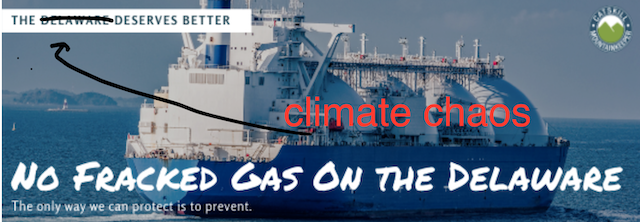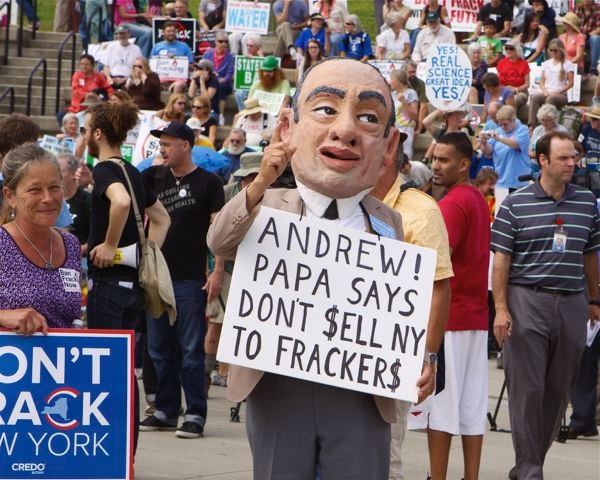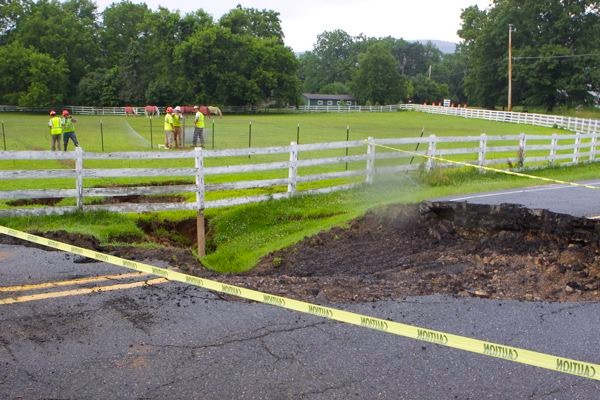DEP Attacks Critics, While Exposing Further Caving to Business Community Opposition
Senator Smith Invokes Right Wing “Regulatory Takings” Talking Points To Undermine Climate Regulations
DEP Is Rigging The Game In The Business Community’s Favor
NJ Spotlight today wrote a followup piece on their DEP climate regulation story last week.
Last week’s Spotlight story was based on an interview with DEP Deputy Commissioner Shawn LaTourette. It included remarkably irresponsible but revealing quotes – bordering on climate denial – which off course I blasted, see:
Just as I predicted (see: DEP In Damage Control Mode), in today’s story, Mr. LaTourette attempted to walk back those remarks, but in doing so, he dug his hole even deeper.
LaTourette falsely attacked critics (while again hiding his dangerous policy views behind “science”). In doing so, he further exposed DEP’s capitulation to business community opposition, and invited an even more damaging attack by Senator Smith, longtime Chairman of the Senate Environment Committee.
Below I’ll explain what’s really going on, but first read the whole NJ Spotlight story:
I) False Attack On Critics Will Backfire
In another stunning set of absurd remarks, Mr. LaTourette falsely attacks critics: (emphasis mine)
LaTourette said the critics were wrong to conclude that the DEP would leave it up to an individual to decide whether it was safe to build a house in a particular location.
“They have nothing to react to at this point,” he said. “For folks to jump to the conclusion that what we may propose to help ready our state to face this great risk, for folks to presuppose that whatever it is won’t be good enough, that’s not following the science.”
What an idiot. And now he not only confirms that he’s an idiot, but that he is motivated by bad faith.
As NJ Spotlight thankfully (but only partially noted), the criticism was based on LaTourette’s own statements:
LaTourette’s first remarks included this: “We are not saying: ‘You cannot build in a future flood-risk area.’”
But LaTourette’s “first” remarks were far worse than that. Here’s what he actually said, which included a statement that it was not DEP’s role to regulate and he used red meat right wing rhetoric to attack both government and regulation:
“We’re not at a point, nor do we think it’s our role, to tell people: ‘Don’t build here, you shouldn’t build there, you can’t do that,’” LaTourette said. …
He said the DEP wants to avoid being the “big, bad government” that imposes heavy-handed regulations.
officials have continued to gather input via a series of virtual meetings with stakeholders and aim to formally propose new regulations “early next year,” perhaps in the first quarter, LaTourette said.
And in trying to cover his tracks and justify his false attack on critics, LaTourette lamely tried to hide behind “science” when he said:
“For folks to jump to the conclusion that what we may propose to help ready our state to face this great risk, for folks to presuppose that whatever it is won’t be good enough, that’s not following the science.”
Critics weren’t “jumping” to any conclusion, critics were responding to MaTourette’s dangerous statements.
Of course, this has zero to do with “science” and by making that absurd “science” remark, Mr. LaTourette – a former corporate lawyer – reveals that he knows nothing about climate science and that the term is just another slogan or talking point to him.
If he were engaged in good faith, Mr. LaTorette should have apologized and admitted that he mis-spoke and set the record straight.
His remarks were so egregiously wrong and embarrassing that the Gov.’s Office and DEP Commissioner McCabe should have issued a public statement distancing themselves from his remarks and setting the record straight.
The fact that none of that happened basically confirms that he did not mis-speak and that his warped policy views represent the position of Gov. Murphy.
That is a very bad sign. Very bad. And instead of damage control, Mr. LaTourette sparked additional criticism.
II) DEP Is Caving To Business Community Opposition And Following Christie’s Anti-Regulatory Playbook
But Mr. LaTorette didn’t just falsely attack his critics.
In his effort at damage control, he revealed a major concession: i.e. that DEP will issue what’s technically known under administrative law as a “pre-proposal”, which he mistakenly called a “road map” (that misrepresentation is totally unacceptable, coming from a lawyer):
“Within the next several weeks, certainly before the end of the year, we will lay out a road map that folks can respond to, that we can take more comment on, before a rule is proposed,” he said. “It is the next phase in stakeholdering these important concepts.”
There are several bad things going on here. DEP is rigging the game.
Procedurally, a “road map” prior to a regulatory proposal is not just delay.
It amounts to a major political concession, because it provides an additional opportunity for the business community to organize, lobby, and work secretly behind the scenes – in the dark – to defeat any strict science based DEP climate regulations.
At the same time, this informal “road map” process also undermines the science and expertise of DEP staff, by allowing the business community to make unaccountable attacks on DEP’s recommendations, with no scientific basis and with arguments based on economics and politics.
Decades of DEP regulatory experience tell me that the business community always intervenes politically behind the scenes directly with the Governor’s Office, the DEP Commissioner, and legislators on major DEP rules and important DEP science that forms the basis of rules. To minimize this political abuse, NJ laws limit that intervention and provide transparency and accountability mechanisms.
The NJ Administrative Procedures Act (APA) – the law that governs DEP’s rule making – does not provide for any informal “road map”. The APA law has 3 regulatory procedures, all of which are formal and on the record, so that they may be reviewed by the public, the legislature, and a court of law (meaning that public comments and DEP responses are transparent). Those 3 valid procedures are: 1) a rule pre-proposal; 2) negotiated rulemaking; and 3) rule proposal.
In contrast to a formal “pre-proposal”, “negotiated rule making” or “proposal” (procedures legally authorized under the NJ Administrative Procedures Act), with a “road map”, the business community lobbying and interventions behind the scenes with the DEP Commissioner and Gov.’s Office will not be transparent and may occur in the dark with no fingerprints.
This invites abuse and undermines the science.
This “road map” process is exactly what the business community asked for.
Specifically, in an October 5, 2020 letter, NJBIA Vice President Ray Cantor (a revolving door former Christie DEP Deputy Commissioner) strongly criticizes the DEP’s regulatory process and urges DEP to slow down and provide additional opportunities for his business colleague to intervene politically: (emphases mine)
As the largest business association in New Jersey, we have requested that the Department allow us to assemble a smaller, representative group of businesses which would meet with the relevant managers within the air program in order to have more focused discussions on the potential proposals. This meeting, and we believe that more than one would be advisable, would be intended to better inform the Department on how to accomplish their goals, to discuss what proposals would work and which would not, to discuss costs and impacts, and to ensure the Department proposes the most workable regulatory changes that are feasible.
Even with additional and meaningful stakeholdering, I also suggest the Department use the official pre-proposal process or circulate proposed regulatory language. The Administrative Procedure Act (APA), as you are well aware, does not allow for significant substantive changes upon adoption. This limitation makes it all the more important that the language crafted and proposed be as precise as possible. Allowing the regulated community and others to review and comment on rule language before it is officially proposed in the Register will give the Department a tool to craft a better rule. In fact, the APA specifically authorizes a pre-proposal process.
[My Note: the NJ APA does not – repeat does not – authorize a “road map” process or the informal process of meetings with DEP managers recommended above by NJBIA.]
DEP Deputy Commissioner LaTourette’s “road map” process concedes to this NJBIA criticism and request.
Quite revealingly, LaTourette even parrots NJBIA Cantor’s gibberish term “stakeholdering”: (NJ Spotlight)
“Within the next several weeks, certainly before the end of the year, we will lay out a road map that folks can respond to, that we can take more comment on, before a rule is proposed,” he said. “It is the next phase in stakeholdering these important concepts.”
It’s obvious that NJBIA’s Cantor has the ear of DEP’s LaTourette. And it’s pathetic that LaTourette parrots NJBIA legal gibberish.
Finally, LaTourette’s DEP is following Gov. Christie’s regulatory policy and procedures, not those of Gov. Murphy.
In the first hour of his first day in Office, former NJ Gov. Christie issued Executive Order #2 , which was designed to “provide immediate relief from regulatory burdens” and prevent “costly”, “job killing”, “red tape” regulations on the business community. EO#2 includes an “advanced notice” process to solicit private sector input before rules are proposed (the NJ APA does not define and authorize an “advanced notice” process. Christie just made that up). Christie’s EO #2 provided the exact “road map” informal process that Mr. LaTourette just confirmed.
Christie EO #2 provides:
1. For immediate relief from regulatory burdens, State agencies shall:
a. Engage in the “advance notice of rules” by soliciting the advice and views of knowledgeable persons from outside of New Jersey State government, including the private sector and academia, in advance of any rulemaking to provide valuable insights on the proposed rules, and to prevent unworkable, overly-proscriptive or ill-advised rules from being adopted.
DEP’s LaTourette just further revealed his prior anti-government and anti-regulatory remarks by following the exact same pro-business regulatory procedures that were not only recommended by NJBIA but previously adopted by Gov. Christie in EO #2.
Perhaps even worse, while following Gov. Christie’s EO#2 process, DEP is not following the regulatory policies and procedures announced by Gov. Murphy’s Executive Order #63 which was designed to revise and replace Christie’s EO#2 on rule making and strengthen the hands of State regulators. (However, EO 63 is seriously flawed, as I wrote).
III) Senator Smith Invokes Right Wing Property Rights Talking Points
Finally, more troubling still were the comments of Senator Smith, longtime Chairman of the Senate Environment Committee.
I’ve worked closely over many years with Senator Smith and know – with the exception of the Highlands Act which he sponsored at the policy direction of Gov. McGreevey – that he strongly opposes DEP land use regulations and often carries the water of the development community.
Senator Smith – despite contradicting himself on the risk of sea level rise and supporting DEP Tourette’s absurd prior comments – really undermined necessary strong DEP regulations by playing, right out of the box, the “takings” card: (emphasis mine)
If the DEP is taking an incremental approach to climate regulation now, that’s because it can’t afford the lawsuits that it would attract if it issued strict rules on development in future flood zones, argued Sen. Bob Smith (D-Middlesex), chairman of the Senate Environment and Energy Committee.
Smith, who frequently warns about the dangers of rising seas at the Shore,said any move by DEP to prevent development of future flood zones would prompt “inverse condemnation” suits claiming that the government has taken private property without compensating the owner, who is therefore entitled to payment.
“If the department took the position that ‘we’re going to tell people where they can and can’t build’, that’s inverse condemnation and you’ve got to have the bucks to back it up,” he said. “To take the role that some people would like to see them take, they don’t have the resources to do it.”
He said the DEP is taking a limited approach to new climate regulation for now, in hope of convincing the public that stronger measures will be needed later.
Smith, in addition to advocating very bad policy, is just flat out wrong on the NJ law on “regulatory takings”. His remarks reflect politics, not science and mis-state the NJ law on “regulatory takings”..
In order to trigger a compensable “regulatory taking”, a DEP regulation must totally extinguish all economic use of a property and violate “reasonable investment backed expectations”.
The risks of sea level rise, storm surge, extreme weather events, flood hazards, and related climate impacts have long been known, and not only to scientists and DEP regulators, but to the general public and investment community.
DEP has been issuing warning Reports on coastal hazards for decades and adopted a federally approved coastal management strategy that addresses coastal risks related to climate. NJ’s coastal land use law, CAFRA, was enacted over 40 years ago.
DEP also has been mapping and regulating inland flood risks under the 40 year old NJ Flood Hazard AreaControl Act.
If anyone didn’t know about all this, surely Superstorm Sandy opened their eyes almost a decade ago. Due diligence comes from simply reading the paper!
So there can be no “reasonable investment backed expectations” to develop in high risk areas.
Furthermore, there are many alternative uses of property that provide economic opportunities, aside from development. So, it would be rare indeed for DEP to extinguish all economic uses of land.
There is no NJ case law I am aware of directly on point with respect to DEP climate regulation and takings, but the precedent is strongly in favor of DEP’s rules, if they are based on science and designed to protect public health, safety and environment.
[Update – a reader agrees, and offers concrete examples:
you did a good job correcting Sen. Bob on takings law…empty land, unbuildable land at the nj coast still has a value as a buffer and privacy measure for neighbors – a market for empty lots for privacy sake…the price of that probably goes way up over time…
I’m a customer: I bid $5 for any unbuildable lots…will take up to ten to add to my portfolio and sell them to neighbors for $10,000 each. ~~~ end update]
Finally, Smith also completely misses the point regarding the objectives of development restrictions to address climate change:
“I don’t think it’s going to be enough to provide the information and the guidelines,” Smith said. “Not everybody is altruistic or thinks in the current moment what is really in their best long-term interests. Their view is very short term, and it’s very hard for them to do the right thing.”
DEP regulations are not designed to protect individual and economic interests. Of course individuals often seek economic gains that violate the public interest, risk pubic safety and health, and harm the environment – that’s why we have regulation in the first place.
DEP regulations are designed to protect the public interest, public health and safety, and the environment.
Shame on Smith, he’s as bad as DEP’s LaTourette.
[End Note: Of course, the science and regulatory issues are far broader than just addressing the risks from flooding under CAFRA and FHACA.
DEP’s own “climate PACT” initiative addresses both emissions reductions and “adaptation”.
In fact, it will be interesting to see how broadly DEP interprets its existing authority to mandate emissions reductions, especially from currently unregulated sources and sectors (e.g. buildings, transportation, forestry, agriculture, “small sources”, etc).
Equally, other state environmental agencies, such as NY State DEC, have built scientific and legal bridges between greenhouse gas emissions and adaptation, including important things like fossil infrastructure (e.g. pipelines) and air and water pollution control laws, greatly expanding regulatory authority to address climate, including “upstream” lifecycle and cumulative impacts.
DEP has very broad authority to comprehensively regulate emissions and adaptation, mandate emissions offsets, mitigation, and energy efficiency, etc but all indications thus far are that they are taking a very narrow approach and repeating historical flaws in various flawed DEP individual permit “silo” programs, instead of comprehensive planning and regulation.
Finally, we note that the recent “environmental justice” bill Gov. Murphy just signed into law does NOT address climate justice. That’s right: it does NOT regulate greenhouse gas emissions or adaptation in EJ communities.
How will DEP Climate PACT regulations address the EJ issues?
We’re not optimistic. More to follow, of course.
PS – In the body of this post, I didn’t want to waste readers’ time or a bullet on this lame idiot Jennifer Coffey, who bases her assessments on personal phone calls to DEP hacks.
In what is an unprecedented move, Jenn TRIPLED down!
Jennifer Coffey, executive director of the Association of New Jersey Environmental Commissions, said she had been concerned about what the new regulations would say, after reading LaTourette’s earlier comments, but feels more comfortable after speaking with him.
“I am confident that the DEP is going to be proposing concrete actions under NJ PACT to mitigate the impacts of climate change and to reduce greenhouse-gas emissions,” she said
That’s how you earn those large Wm. Penn and Dodge Foundation and DEP grants. It’s how you get political appointments to DEP lackey private industry controlled groups like the Water Supply Advisory Council. ~~~ end]



